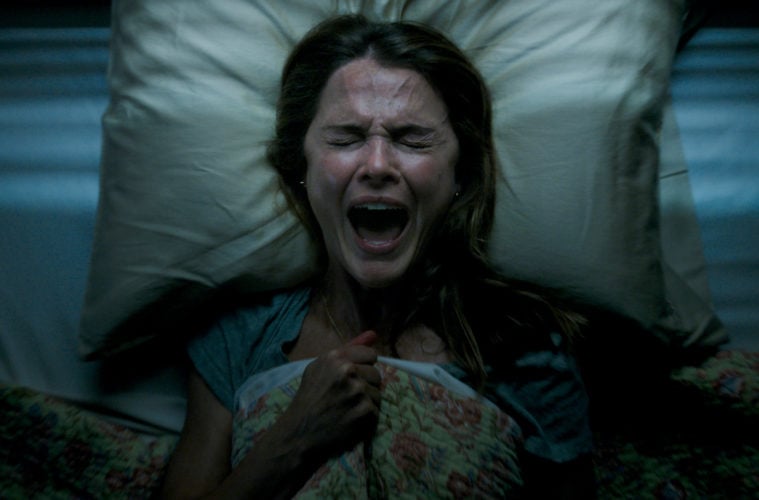Horror films have always been great vessels for social commentary. The genre allows such messaging to feel natural, never hitting us over the head with yesterday’s headlines. Scott Cooper’s Antlers is an expert example of the way this works, though it’s far more than just a timely allegory wrapped in a terrifying package.
Based on a short story by Nick Antosca and produced by Guillermo del Toro, the horror in this film is specific, personal, and tied to generational trauma, with a focus on the way it can come back to bite us. It’s a cold, bloody, ominous and overdue exploration of abuse in America.
In the tradition of Hereditary and Relic, Antlers explores our nation’s grief through a middle-class family. In the prologue, an adorable seven-year-old boy named Aiden (Sawyer Jones) accompanies his father (Scott Haze) to a meth lab that’s been set up in an abandoned coal mine. They hear something growling in the distance…something hungry.
Flash forward, and Aiden’s 12-year-old brother Lucas (Jeremy T. Thomas) is in English class, barely holding it together. He’s obviously troubled– like every kid in horror movies, he draws pictures of demons in his notebook–but it’s not quite clear why he’s troubled, or why we he wanders into the forest, or why he tosses corpses into the attic.
His teacher (Keri Russell) chalks up Lucas’ behavior to parental mistreatment initially, something she knows all too well having grown up in an abusive household. But she can’t ignore the parallels between his drawings and the supernatural happenings in their small town, so she decides to follow Lucas and see what’s going on. Big mistake.
The drawings are of an ancient Indian spirit known as the Wendigo, who’s attached itself to Lucas’ father for all the bad things he’s done. When she stops by Lucas’ house, the monster is let loose.
Antlers is the first horror flick by Cooper (best known for 2009’s Crazy Heart and 2017 Hostiles). The filmmaking is efficiently creepy, if a bit grotesque for this first foray. The camera lingers on bodies long enough for you to start squirming in your seat, and the sight of a decomposed corpse will make you gasp out loud.
Javier Narvarente’s score is equally forceful. The piano keys practically scream, “something bad is about to happen here!” The film is a bit more effective when it aims for subtlety over scares, but Cooper’s approach to tone is unabashedly ghastly, embracing the not-so-subtle elements of horror that make us shiver and cringe in fear while utilizing these elements to tell a story about grief and catharsis.
He tackles both not just through the monster and Indian lore, but also through the ways that memory and history come back to haunt us. Antlers articulates how trauma never really goes away, and how no one stands a chance unless they face their demons head on. In a country ravaged by abuse, both child and marital, and devastated by drugs, death and poverty, that means different things to different people.
For Lucas, it means facing his father; for his teacher, it means facing Lucas; and for some audience members–especially now, as domestic abuse cases surge over the pandemic–it may mean facing themselves.
Advertising disclosure: We may receive compensation for some of the links in our stories. Thank you for supporting LA Weekly and our advertisers.

